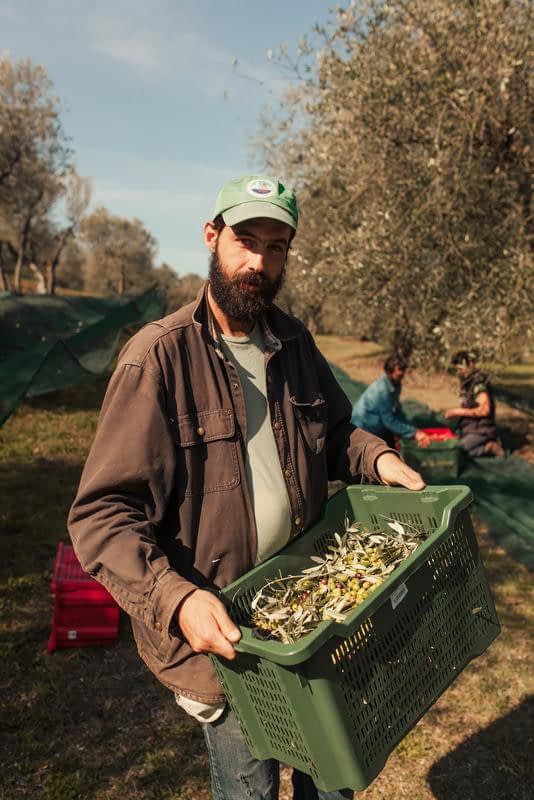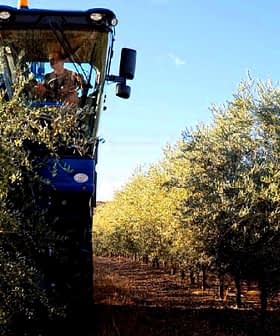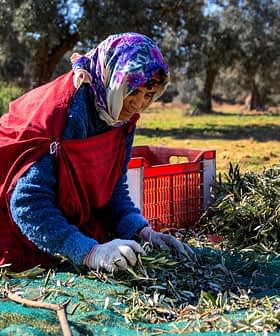Small-Scale, Regenerative Farming Drives Quality for Maraviglia in Tuscany
Since 2019, the producer behind Agricola Maraviglia has found a symbiotic balance between nurturing the landscape and producing award-winning olive oil.
 Agricola Maraviglia farmhouse
Agricola Maraviglia farmhouse The locals in Monte San Savino say that when the pilgrims who traveled from France to Rome stopped and admired the landscape, they said che maraviglia, meaning, “how marvelous.”
Hence, the name of Agricola Maraviglia and its namesake organic blend of Moraiolo, Leccino and Frantoio olives produced in the hills surrounding a village near Arezzo, in Tuscany, was born.
A limit in the size of the company allows us to be truly sustainable, and I believe that this represents the only way quality agricultural work can be carried out.
“I grew up in what today has become the farmhouse, that was originally my family’s home, surrounded by a hundred olive trees,” founder Francesco Piattelli Palmarini told Olive Oil Times. “As often happens, those born in the countryside want to escape, so I did.”
“I left and lived abroad for 15 years, ten of which I was in New York, where I had a job that I really enjoyed in communication, branding and design,” he added. “Yet at some point, I started realizing that I needed to rediscover the contact with the land and nature, and I decided to return.”
See Also:Producer ProfilesPiattelli Palmarini describes himself as part of the new generation of farmers that entered the world of high-quality extra virgin olive oil starting from scratch. Established in 2019, the company earned Gold Awards in three consecutive NYIOOC World Olive Oil Competition editions.
“When I started planning this project, everybody said I was crazy because I was quitting a secure job to throw myself into agriculture, taking on a new challenge all by myself,” Piattelli Palmarini said.
“My parents were not in the olive oil industry,” he added. “I could just rely on the skills gained from my former work where I promoted brands, and I thought I might apply them to a project of my own. The results achieved hitherto tell me that I made the right decision.”
The estate dates back almost 400 years when a colony of tenant farmers settled it and started cultivating different crops.

Francesco Piattelli Palmarini participates in the manual harvest of his groves.
“The first settlers applied a system of polyculture, which was widespread in the past,” Piattelli Palmarini said. “I am trying to reintroduce it since it offers several advantages, starting with fostering biodiversity.”
“Preserving the quality of the environment is indeed one of our primary goals, and the first thing I did in this regard was to take care of the ancient olive trees on the property that constitute a true heritage,” he added.
All the trees survived the frost of 1985. Some were heavily damaged but were regenerated from the stumps and are now recognizable, with trunks split into two or more branches; others came out unscathed and have developed huge, impressive structures.
Piattelli Palmarini decided to take care of the neglected orchards nearby as he had noticed that many families who used to produce olive oil for personal consumption had abandoned their olive groves due to the rising production costs and no generational turnover.
“I contacted the owners of the surrounding abandoned plots, and we agreed that I would take care of them to make them productive again,” he said. “Now I can count on several orchards, each containing 100 or 200 olive trees.”
“Every year, according to the trend of the season, I can choose those with the best outcome and which allows me to stick to the proportions envisaged for my blend,” Piattelli Palmarini added.
With his wife, Francesca Gambato, he manages 1,300 olive trees. Most of the trees are arranged on steep terraced terrain supported by ancient dry stone walls, a layout that does not permit the use of vehicles and requires a manual harvest.

Francesca Gambato and Francesco Piattelli Palmarini
“Morellino (Tuscan for Moraiolo), a rustic variety that finds its ideal habitat on these slopes, was the prevalent variety in the past,” Piattelli Palmarini said. “It is resistant to dry conditions, while, on the other hand, benefits from the optimal rainwater drainage provided by the terraces.”
“It is not easy to manage because its fruit is quite resistant. Since we carry out an early harvest, picking the olives is even more difficult,” he added. “Nonetheless, I intended to honor the original setting cultivated by the local growers who planted the orchard. I created a blend of 70 percent Moraiolo and the rest of Frantoio and Leccino in equal shares.”
The company relies on a local mill with state-of-the-art machinery, updated annually, to make the most of the fruit. A local variety called Biancaccio used as a pollinator, is also planted in the orchards, interspersed with some plots of wheat and legumes.
“Our special feature is that, besides olive oil, we produce miso, tamari and shoyu (soy sauce), typical seasonings of Asian cuisine, from Tuscan autochthonous raw materials,” Piattelli Palmarini said. “In particular, we cultivate an ancient type of barley and chickpea, grown during the Renaissance, called Cece fiorentino.”
After being collected, they are inoculated with the spores of a fungus known as kōji mold (Aspergillus oryzae) and then left to age in barrels for at least one year – the company has a dedicated laboratory that allows for a closed-cycle production process.
“We aim at proposing a small, indeed almost micro, production model that guarantees the quality of the entire supply chain, starting with the raw ingredients,” Piattelli Palmarini said. “Moreover, they all come from organic land managed according to regenerative agriculture techniques.”

Due to the terraced olive groves, a mechnaical harvest is impossible at Agricola Maraviglia.
The company has implemented a series of sustainable practices based on the regenerative farming method to improve soil quality and enhance the hydrological cycle.
“We are focused on total sustainability not only because this underpins our life philosophy,” Piattelli Palmarini said. “Science tells us the importance of keeping the soil healthy, especially after decades of irresponsible management of the agricultural land, and such awareness compels us, today’s farmers, to take care of the environment, starting with the land where we cultivate our crops.”
With this view, Piattelli Palmarini cultivates various types of plants to enrich biodiversity and provide different nutrients to the soil with the practices of cover cropping and green manuring.
“There are plenty of different types of grass to be sown beside the well-known field bean,” Piattelli Palmarini said. “Alfalfa, with its deep roots loosening the earth, is just an example among many varieties that help the soil to be naturally soft and more capable of retaining moisture, aspects that we seek to improve also by applying the no-tillage technique.”
The environmentally aware approach pursued by the Tuscan producer is intrinsically linked to the small number of olive trees managed and the limited dimension of the production lines, which are part of a deliberate choice.
“In my opinion, a limit in the size of the company allows us to be truly sustainable, and I believe that this represents the only way quality agricultural work can be carried out from now on,” he said. “Many retailers are also going in this direction with an ever-increasing number of small independent boutique stores looking for creative producers who have a story of quality to tell to the consumers.”
“When those who sell the products also acquire consciousness, consumers can be better supported to recognize and enjoy quality products,” Piattelli Palmarini added. “And this generates a new virtuous circle, which reduces costs for both sides. With our model, we want to stimulate such a trend that improves both the quality of operators’ work and the consumers’ awareness and wellbeing.”
Along with the commitment to preserve the landscape while keeping the ancient terraces productive, producing a world-class extra virgin olive oil can be highly challenging.
“All this requires extra work and higher production costs, especially in certain difficult seasons,” Piattelli Palmarini said.
“However, besides the environmental value of our activity, the great results and satisfactions we have achieved so far tell us that our vision is right and motivate us to go even further in the pursuit of quality and dedication to integral sustainability,” he concluded.








